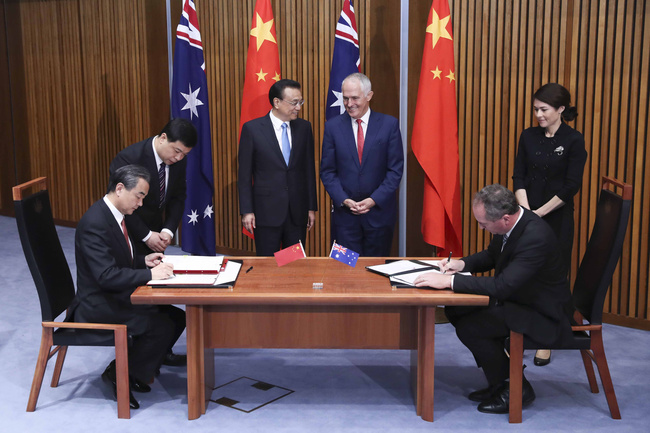Premier's visit embraces great opportunities for Sino-Australia cooperation in B&R era

By Xu Qinhua
Just as the title of his article to the Australian media "We want to work with you for progress and peace", the visit of Premier Li Keqiang is answering the question "what China and Australia can do together to cope with questions of growing uncertainties and disorientation" and "to turn challenges of our time into historic opportunities, contributing the impetus needed for China-Australia relations and the world to move forward".
Such answering discloses that Premier Li's visit embraces great opportunities for the Sino-Australia economic cooperation especially in the B&R(Belt and Road Initiative) era.
The main characteristics of the B&R era is the nations no matter big or small, developed or developing, capitalist or socialist are all collaborating with each other to contribute to build the public goods of booming the regional and global economy through the liberalization of trade for a community of common destiny for all mankind.
Therefore, the joint endeavor will be supplying with the APEC region and also the whole world where both China and Australia are two key stakeholders the public goods of impetus to the healthful development.
The economic relationship between China and Australia has a long history and very solid ground. China is Australia's largest two-way trading partner in goods and services valued at $150.0 billion and China is Australia's largest resources and energy market, with exports worth more than $59 billion in 2015-16, more than a quarter of AU's total goods exports to all countries.
Wool has been an important agricultural commodity of Australia's exported goods to China since the 1970s, but the surge in resource trade has now eclipsed Australia's wool exports.
Chinese direct investment in Australia reached $35.2 billion in 2015 who is the AU's fifth largest direct investor. The majority of investment has been in resources but is moving into agriculture, tourism and infrastructure with the reduced demand of energy and resources in China.
One reason that Australia's economy survived the global financial crisis of 2008-09 better than most other developed countries, is due to China's robust economy and resource buying.
Recent years with the economic growth slowing down, the traditional mode of economic relationship between China and Australia, in which the resources and energy trade and investment play a key role faces with the risks of sustainability.
For example, iron ore has been Australia's principal export to China for many years, but the serious Chinese demand for iron ore seems has been damped because of its weakened national need and the future growth will be moderate if not disappear.
Both Australia and China have acknowledged the above-referred risks, and decide to find out the way to avoid them, however, choosing to adopt different hedging strategies in response respectively.
The Chinese government made the decision to invest overseas in the hope of integrating its productivity and adjusting its supply chain. In contrast, the Australian government is attempting to expand its service exports and others.
At the right time, the framework and of the B&R bridge the gaps for two countries to meet their need on the same platform.
Taking the energy resources cooperation as another example, we can see, inside the B&R alongside region, there has gradually formed a complete, circular demand and supply (DS) system.
The system is composed of three sorts of countries, the energy exporters, the energy importers and energy transit countries, which not only can help reduce the Asian gas premium but also help take what one needs.
That is the public goods and can make the economic relationship between China and Australia much broader and more stable and sustainable than ever.
(Acknowledgement and thanks to the data sharing of Shi Xunpeng of UTS Australia)
The author is a professor with the National Academy of Development and Strategy at Renmin University of China.






